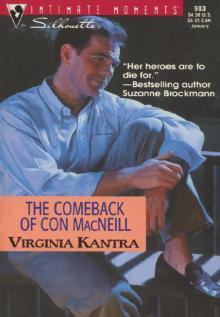- Home
- Virginia Kantra
Carolina Man (A Dare Island Novel) Page 5
Carolina Man (A Dare Island Novel) Read online
Page 5
He glared. “What do you want from me?”
She wanted him to understand. She was trying to help. “This isn’t about what I want. It’s about what Taylor needs. What are your plans for the future?”
“Well,” he drawled, “I was going to have another beer. And then I thought I’d take a whole night off to visit with my family. Get to know my daughter. Do I need to write that down for the judge?”
Her cheeks burned.
This is what came of getting personally involved. Of reacting emotionally, impulsively, instead of thinking things through. Naturally, he resented her interference.
“I’m sorry,” she apologized stiffly. “Sometimes I get a little . . .”
Judgmental, one ex-boyfriend had accused.
Controlling, her therapist had said.
“Focused on the mission,” Luke supplied.
She blinked in surprised gratitude. “That’s a nice way of putting it.”
Anyway, it beat Will Brown’s Interfering bitch.
Luke rolled his bottle between his hands. “Look, I get that you’re trying to help. I appreciate you driving out here to give us the heads-up on this social services thing. I’ll make the appointment with your friend, I’ll cooperate my ass off with her questions. But the rest of it . . . We’ll make it work. You said yourself that Taylor’s adjusting. You just don’t understand how it is in a military family.”
“I understand very well.”
“You think you do. But you only see the ones that don’t make it. It’s different from the inside.”
“Not in my experience.”
“Let me guess.” Those sharp blue eyes narrowed on her face. “Your ex-husband’s a Marine.”
Kate tugged on her jacket, pulling it around her like armor. “My father.”
Oh, hell. She hadn’t meant to say that. She didn’t talk about her family. Habit and shame kept her silent. She’d grown up, moved out, moved on. But her father still loomed in her memory, a shadow figure between them.
“Would I know him?”
God, she hoped not.
“Colonel Roger Dolan,” she said. Square-jawed, close-shaved, meticulously pressed and polished. “He died two years ago.”
Luke shook his head. “Nope. Sorry.”
“Don’t be.”
Their relationship was over long before he died.
A midlevel bureaucrat, Colonel Dolan had never received the respect or recognition he felt he deserved. But he’d commanded fear from his men and wife and daughter. Obedience is required in a war zone, he insisted. And he’d made home a war zone.
His discipline was absolute and arbitrary. His professional frustration found relief in drinking and outlet in a senseless, ceaseless battery of orders, inspections, and foam-flecked, screaming rages on the parade ground and at home.
As a child, Kate had tried desperately to please him. But no matter how clean she kept the house or how well she did in school, nothing was good enough. She was not good enough. She could not make up for her father’s career disappointments. She could not fix his drinking.
She could not wait to get away.
And she never went back.
She fought a shiver.
Luke watched her, his blue eyes unreadable in the twilight. What did he see? How much had she betrayed?
“You want to reconsider that drink now?” he asked.
She laughed, relieved because he was kidding. Not that she would ever, under any circumstances, drink as a response to stress. But he was dropping the subject, and that was good. “No, thanks. I really should get going.”
“You’re welcome to stay. There’s plenty of food.”
For a moment, she was tempted. Not just by the tantalizing aroma of slow-cooked ribs, but by the warmth of a real family. By the simmering heat in Luke’s eyes.
She shook her head. She wasn’t good in personal, social interactions. She had no guide for normal behavior. And she hated to guess. “I shouldn’t intrude.”
“Bit late for that,” he said. “For both of us.”
Four
LUKE SAW THE light under Taylor’s door as he went up the stairs.
She has nightmares, his mother said.
Poor kid. Luke could sympathize. He couldn’t remember the last time he’d had a good night’s sleep. Two A.M., four A.M., regular as clockwork, he woke with a racing heart and gritty eyes and a stale taste on his tongue. The Corps trained you to kill, but nobody trained you how to deal with it. In your dreams, you never remembered the ones you saved, only the ones who died.
He wondered what Taylor dreamed about. Her mother, probably.
Hell.
He hesitated outside her door, tension knotting his muscles. Should he knock? It didn’t seem right that there were at least three adults downstairs who knew more about putting his daughter to bed than he did. Kate’s words popped into mind. Now that you’re back, the Simpsons will argue that you don’t have a relationship with Taylor. A continuous, meaningful relationship.
In the short time he’d been home before, they hadn’t had the chance to establish a routine. Taylor hadn’t seemed to need anything from him then except to be left alone.
He didn’t have a clue what she needed from him now.
He took a deep breath and rapped softly on the door before opening it.
A flurry of movement exploded from the bed before Taylor flopped back against her pillows, clutching her covers to her chest like she was hiding something. What? Christ, she was only ten. What did she have to hide?
Her face was all red, her blond hair sticking up all over her head like corn silk. His desert-colored utility cap rested on the pillow by her head. Luke’s heart turned over helplessly in his chest.
Tucking his hands into his pockets, he wandered into the room. Fezzik looked up with a doggy grin, thumping his tail against the braided rug. So that explained the sudden movement from the bed. The dog probably slept with her. Must take up half the mattress.
He rubbed Fezzik’s head and then straightened. “Hey.”
Taylor watched him with wary, narrowed blue eyes. “Hi.”
This close, he could see the cords trailing from her ears. An iPod. He hadn’t given her an iPod, he thought with a twinge of guilt. He wondered who had.
“What are you listening to?”
She pulled out one ear bud. “Music.”
He waited, but apparently her answer had exhausted that topic. He glanced around the room. “You all settled in here?”
She nodded.
The room, his mom’s old sewing room, was as neat as a soldier’s tent. No posters on the walls. No stuffed animals. No dolls. Maybe she was too old for dolls, he didn’t know. No family pictures. Luke frowned. Every guy he served with carried a photo of somebody. His mom had pictures of the three of them—Matt, Meg, Luke—scattered around the house. Taylor ought to have a picture of her mother. Still, there was a stack of school books on the desk, a rocking chair in the corner, a collection of shells spaced out along the windowsill. Signs, he hoped, that the kid was making herself at home.
A judge will look for evidence that you can provide for Taylor, Kate Dolan reminded him earnestly. Her physical needs. Her medical care. Her emotional well-being.
“Do you need anything?” he asked, and he wasn’t just talking about a drink of water.
Taylor shook her head.
“Okay.” He took his hands out of his pockets. Nothing else he could do tonight.
She looked so little against the pillows of the bed. Was he supposed to tuck her in or something? Matt would know. He should have asked Matt.
“Well . . .” Luke cleared his throat. “Good night.”
She slumped deeper under the covers. “’Night.”
Dismissed. Relieved, he shoved his hands back into his pockets and turned toward the door.
“Do I have to move now?” a small voice asked behind him.
He froze. Shit, oh, shit. He did not want to get into this conversation on his first nigh
t home.
We’ll make it work, he’d told Kate. You don’t understand how it is in a military family.
He did. He’d moved four times before he was eight years old. Somehow his mom had held them all together, making each reassignment seem like an adventure. With Matt watching out for him, with Meg charging ahead, Luke had never felt lost or alone. Back to back to back. The rallying cry of his childhood.
And then Dad retired, and his parents bought the Pirates’ Rest, and the island became home. For most of his childhood, Luke had run as wild as the island ponies, protected and free.
He’d figured it would be the same for Taylor.
But maybe he’d taken too much for granted. Maybe the Simpsons were right. In four short months, the kid had lost her mom and relocated twice. Maybe she wanted it all back—her old friends, her old school. Her old life.
Wouldn’t that be a kick in the teeth.
Slowly, he turned. “Do you want to move?”
He watched—shocked, terrified—as tears sprang to her eyes. “Uncle Matt said I could stay.”
“Okay. Jesus. Don’t cry.”
Her tears panicked him. Marines did not cry. And if they heard her downstairs, his family would never let him hear the end of it. Major Fatherhood Fail, his first night home.
She sniffed mightily. “You’re not supposed to swear.”
Shaken, he groped for his bandanna. “Yeah, you’re right. You don’t have to . . . You’re not going anywhere, okay? We’ll figure this out.” Together. Somehow.
She knuckled her eyes in a gesture that tore his heart.
“Here.” He thrust the bandanna at her and dropped into the rocker while Taylor mopped her eyes and blew her nose. His own throat constricted. Burned. He cleared it noisily. “You okay?”
Her head wobbled up and down.
“Good. That’s, uh . . . good.” Okay, dumbass, make this right. He leaned forward, elbows on knees, thinking fast, going with his gut. “Here’s the deal. I’ve got thirty days’ leave coming before I have to go anywhere.” After that, he probably had another three months, training, before he deployed again. But that was a discussion for another day. “I want to be with you. You could stay in your room here, but a month’s too long for me to be bunking in a guest room. So I figure I’ll talk to Grandma and Grandpa about renting the other cottage out back. For the two of us.”
Taylor nodded, more decisively this time. “Like Matt and Josh.”
He released his breath in relief. “Yeah.” His parents would probably be glad to have the rent in the off-season. “Everybody will still be around, to take care of you and stuff, but we’ll have our own space.”
And maybe having a place of their own would be enough to convince social services that he and Taylor were a family.
Maybe it would even convince them.
His daughter was regarding him with the abused expression of a dog who’s learned Want to go for a ride? was code for a trip to the vet. “What if we have to leave? Like, if the cottage is rented to guests or something?”
Man, she didn’t trust anybody. That seemed like an advanced worry for a ten-year-old, but what did he know about kids?
“Then I’ll shift for a couple of nights, sleep on the boat or your uncle Matt’s couch, and you can have your old room here.”
Taylor’s face scrunched as she considered. “Could Fezzik come, too?” she asked at last.
At the sound of his name, the big shepherd mix raised his head from his big paws, his dark eyes fixing on her face.
“We’ll see.” Luke gave the dog another quick, careless rub, thinking of his surprise. “Fezzik is Uncle Matt’s dog.”
“Uncle Matt says Fezzik is the family dog.”
For a guy who didn’t say much, Luke thought, Matt sure had been running his mouth a lot. “Sure. Yeah. But it could be cool to have your own dog.”
“Or a cat,” Taylor said, with a look through her eyelashes.
No. Hell, no. His plans did not include a cat. “A dog,” Luke said. If everything worked out the way it was supposed to. “Maybe a puppy.”
He’d hoped—maybe he’d counted on—her being delighted. Everybody said she loved the dog, slept with him every night. Luke had figured he had this one chance to be a hero, to get this one thing right.
Her face took on the mulish expression he saw sometimes in his own mirror. “A cat would be better.”
“No cat,” Luke said. He couldn’t take care of her and the dog and a cat, too.
She nodded, not delighted, not disappointed, just . . . resigned. Like she was used to not getting what she wanted. Shit.
“Sorry,” he said, meaning it.
She jerked one shoulder. “’S okay,” she said, when it was obvious things were not okay, that something was wrong.
Luke frowned. “It’s not that I don’t like cats. It’s just . . .”
“You’re allergic,” Taylor said in a tone of voice that suggested she’d heard that excuse before.
“No,” Luke said, surprised. Let it go. Go to bed. Get out of the kill zone. But what came out of his mouth was, “Why would you say I was allergic?”
Another shrug. “That’s what Grandma Jolene always said. Before. When I asked her.”
“You asked your grandmother for a cat,” Luke said, feeling his way.
“I told her I wanted my cat. Snowball. But Grandma Jo said we couldn’t keep her because of her allergies.”
“You have a cat.” First he’d heard about it. He wondered if Matt knew.
Her head jerked. Yes.
He was groping, trying not to blunder in the dark. He needed twelve hours’ sleep and maybe one less beer. “So, where is it?”
Her shoulders hunched. “I don’t know.”
“Well, who’s taking care of it?”
“I don’t know. Grandma Jo said I couldn’t bring her with me. She said Snowball could take care of herself. But Snowball is an inside cat. She doesn’t know how to climb trees.” Taylor’s voice rose, the trickle of words churning into a flood. He was drowning here. “She could be run over by a car. Or eaten by a dog.” Fezzik lurched to all fours, responding to the word or her tears. “She’s probably . . .” Taylor broke off.
Dead, Luke thought bleakly. Like her mother. This was the burden his daughter had been carrying alone.
“Hunting,” he said. “She’s probably hunting for food.”
Fezzik nudged Taylor’s hand as it lay on the covers. She stroked the dog’s big head.
Even the dog was better at comfort than he was. Luke cleared his throat. “Cats are tough. Hell, we had cats in Afghanistan could take down . . .” Rats three times their size. Not a comforting thought to send with her into sleep. “Cats are good at surviving,” he said instead.
Taylor blinked. “But she’s all alone.”
Ah, Jesus. “It’s okay,” Luke said. “Everything’s going to be fine. I’ll take care of it.”
Those blue, tear-sheened eyes fixed on him. “How?”
He had no idea.
“I’ll figure it out,” he said.
• • •
LUKE WAS USED to going door-to-door in hostile territory. He couldn’t let a little thing like the Simpsons reporting him to Child Protective Services discourage him from his current mission. At least they weren’t going to shoot him through the door.
Probably.
He’d been to their house before, when he came to collect Taylor three months ago. Forty years ago, in his parents’ day, this town had a textile plant and a sign out on the highway: THE KKK WELCOMES YOU TO TWISTED CREEK. But the town had died along with the factory. Here and there the residents had tried to get into the Christmas spirit with plastic Santas and strings of Christmas lights, but the streets were pocked with barred and empty storefronts, and the sidewalks were cracked.
Ernie and Jolene lived in a cinderblock bungalow with a detached shed near the end of a block. Luke parked his Jeep, collected from the storage lot that morning, and climbed the steps. The sound o
f the TV inside almost covered his knock. The sagging porch held a mildewed couch, a broken fan, and a black plastic trash bag, but he could smell ammonia, as if someone had recently tried to clean something.
The limp curtains in the front window fluttered.
Dawn’s mother, Jolene, opened the door, a big woman built like a biscuit with large, white arms and a doughy face and pale, protruding eyes. “You. What are you doing here?”
Be professional, be polite. “Hi, Mrs. Simpson. I want to talk to you about Taylor.”
“Unless you’re bringing Taylor back, I got nothing to say to you. You can talk to our lawyer.” She started to close the door. Luke stuck his foot in the way.
“Jolly, who is it?” Ernie Simpson called from inside.
Jolly?
Luke raised his voice over the noise from the TV. “It’s Luke Fletcher, Mr. Simpson. I was hoping you could tell me what happened to Taylor’s cat after Taylor came to live with you.”
Jolene crossed her pillowy arms across her massive bosom, blocking his view inside. “I don’t know. We couldn’t have it here. I have allergies.”
“So you took the cat to a shelter?”
“And have them put it down?” She looked genuinely shocked by the suggestion. “I couldn’t do that. It would have broke poor Taylor’s heart.”
So they’d abandoned the cat instead. Thinking of the strays he’d known, Luke thought it was probably the cruelest thing they could have done, both for the pet and Taylor.
Ernie came up behind his wife, as brown and thin as she was pale and round, with dark wisps of hair on his head and chin. His look of bleary suspicion hadn’t changed in ten years, as if Luke was still a high school boy up to no good with his daughter.
Luke suppressed a twinge of guilt. Ernie Simpson had been right about him back then. But times had changed. He had changed. “Hi, Mr. Simpson.”
“What do you want?”
“Do you have a minute? I wanted to talk to you about Taylor.”
“I’ll tell you what about Taylor,” Jolene said, her round face set. “That little girl don’t belong to you. She belongs with us. She knows us. It’s not right for you to come here and take her away from her own family.”

 Meg and Jo
Meg and Jo All a Man Can Do
All a Man Can Do THE COMEBACK OF CON MACNEILL
THE COMEBACK OF CON MACNEILL All a Man Can Be
All a Man Can Be MAD DOG AND ANNIE
MAD DOG AND ANNIE![Dare Island [2] Carolina Girl Read online](http://i1.bookreadfree.com/i/03/26/dare_island_2_carolina_girl_preview.jpg) Dare Island [2] Carolina Girl
Dare Island [2] Carolina Girl Forgotten Sea
Forgotten Sea Sea Lord
Sea Lord THE PASSION OF PARICK MACNEILL
THE PASSION OF PARICK MACNEILL All a Man Can Ask
All a Man Can Ask Home Before Midnight
Home Before Midnight Family Secrets: Books 5-8
Family Secrets: Books 5-8 Carolina Dreaming: A Dare Island Novel
Carolina Dreaming: A Dare Island Novel Carolina Home
Carolina Home GUILTY SECRETS
GUILTY SECRETS Carolina Blues
Carolina Blues Carolina Man
Carolina Man Carolina Man (A Dare Island Novel)
Carolina Man (A Dare Island Novel) STOLEN MEMORY
STOLEN MEMORY Carolina Heart
Carolina Heart Immortal Sea
Immortal Sea THE TEMPTATION OF SEAN MCNEILL
THE TEMPTATION OF SEAN MCNEILL Sea Fever
Sea Fever